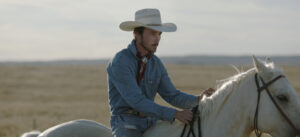1. Understand That Production is Problem Solving
Even with Alonso’s impressive resume, she still feels the pressures of recent times. “To try to produce while the world has been shut down left, right and center has been one of the most challenging and heartbreaking moments because, you all [know] from the indie world, you know that it’s never easy, ever. It doesn’t matter if you have more or less money. It’s always a challenge,” Alonso says. “On top of COVID we’ve had earthquakes, hurricanes and all kinds of heat, fires and other stuff that nobody would ever think is normal. It’s been quite difficult.”
The most important part of maintaining a career in a notoriously difficult industry, particularly in unprecedented times such as these, is to keep the love for the craft alive—and to acknowledge the pain that comes along with it. “[We are] in a time of COVID where a lot of crazy stuff has happened and we’ve had so much loss. One of my most dear phrases that we created for [WandaVision] is, ‘What is grief, if not love persevering?’ I think because COVID is a time where we’re grieving freedoms, people, time, places [and] chances, please know there’s better times coming and love will persevere, because it does conquer it at the end of the day.”
Regardless of an ongoing pandemic or natural disasters, keeping the love alive is an essential part of working in the demanding, ever-changing world of film production. “Production is problems. That’s what it is, solving things,” Alonso explains. “Nothing is perfect. It’s one thing after the other, after the other, after the other. What does it teach you? It teaches you that if you don’t love this job, walk away. It will challenge you every day to no end. If you don’t love it, why are you doing it? The truth is, this is the kind of job that consistently will find what you’re made out of.”
Being a producer in particular requires you to focus on problems and changes, but not just in regards to the schedule or the budget; working with a huge team of people for long hours is bound to bring up many emotional needs as well as logistical ones, and producers need to develop the appropriate skills needed to navigate those conversations. “You have to be patient. As a producer, you’re a party planner and you’re a psychologist. You are a storyteller and you’re somebody’s mother,” she says. In Hollywood especially, a big part of managing a team of people is managing their fears. “Fear of failing is one of the things that comes up a lot in Hollywood, and the reason why is because a lot of people come to Hollywood to prove something.”
In any role on a film or at any point in your career in Hollywood, Alonso says it’s crucial to remember one thing: “You are worthy. You don’t have to prove it to anybody and you will get through the best way you can. People are always saying ‘I don’t want to fail you.’ My answer to that has been consistently: how could you possibly fail me if you give me all you’ve got?”
When you have joy, you have harmony and if you have harmony, you can create.
Victoria Alonso Tweet
2. Respect the Collaborative Nature of Filmmaking
“If you think you’re doing it alone, please go work at a hedge fund, this is not for you,” she explains. “Especially if it’s producing that you’re trying to do. Nobody thanks the producers for anything. It is about your team, it is about the people that you surround yourself with and it is about the love for what you’re doing consistently that will lead you to a successful outcome.” Treating yourself with respect and grace and trusting that you are doing your best at all times also extends to the way you treat those around you. Filmmaking is a deeply collaborative medium, and there is no point at which you will be solely responsible for the outcome of your project.
“The same way that I talk to creative folks is the way I want to be spoken to, with the utmost level of respect and honesty,” Alsonso says. “If you beat around the bush, you’re wasting time and money. And there’s nothing more to it. If you’re beating around the bush, you’re assuming you’re going to hurt somebody’s feelings which means you’re being codependent about somebody’s feelings and that’s not your job.” You know you are doing the best you can for the sake of the project, and you need to remember that each member of the team is doing the exact same thing.
Alonso’s extensive background in visual effects gave her a sharp perspective on collaboration prior to becoming an executive producer, where she is now in charge of overseeing the needs of hundreds of people. According to Alonso, it all starts with effective communication. “You have to always have that in mind that what you see and what you get is not always what you’re going to need at the end,” she says. “So you need to partner up with whoever is your vendor or the facility that is doing your work to make sure that you are 100% in sync of what you’re creating as a filmmaker and what the vendor is creating for you, that you are seeing the same [shade of] blue.” If you’re not completely on the same page with your team, she says, “[you’re] going to end up burning money trying to get to that shade of blue, so the more important thing is I show up with it, with my blue and say ‘OK, match this.’ Do we always succeed? No. We fail all the time because it’s not a perfect science. Don’t go thinking that we have it together. Every movie is its own challenge.”
Alonso’s love for the possibilities of technology is largely a reflection of her love for the inherently creative and collaborative nature of filmmaking in general. “Visual effects is that marriage of creative plus technology, so you get a bunch of creative people that can dream it then you get a bunch of technical people that can make it and you can have a dream come true through the art of technology,” Alonso says.

3. Know Who You Are—and Use It
According to Alonso, the foundation for a healthy career must be built on your ability to remember who you are, embrace your background and always focus on what is most important to you throughout your life and work. “Is this a job that will define your identity, or is this a job that will complement it?” Alonso asks. “If it is going to complement it, then you will have a reasonable amount of money, you will find a reasonable amount of power. That is a place of power that no fame can take away, no money can pay for. Because your heart is full and you have joy and when you have joy, you have harmony and if you have harmony, you can create.”
Alonso grew up in Buenos Aires, Argentina, and is often asked about her background, particularly when it comes to the topic of diverse representation on screen. Representation, Alonso says, is critically important to her as an executive producer. “Is it coming fast enough for you? No, I’m sure it’s not. Would I stop until it’s done? No, I won’t. I’m going to die when I’m 108 and work until I’m 96, so we’ve got another 40 plus years of me working at this company.”
No matter how Hollywood has tried to challenge her sense of identity, Alonso says she has not been willing to let it change her devotion to her own individuality. “I have been who I am throughout my entire life and I didn’t change it for Hollywood, I didn’t change it for Marvel and I didn’t change it for Disney. Has it helped me? I have no idea. I am here, I can tell you it didn’t hurt me because I’m here,” Alonso says. Building such confidence is a key piece of advice Alonso gives to those who are navigating their path into the entertainment industry. “When you walk into Hollywood and you don’t know who you are, Hollywood will make you into what they need you to be. They will take you like silly putty and they will make you into whatever they need that day. If you were a watermelon one day, you will be an apple the next day.”
Despite how daunting the industry can be and how much pressure is placed on you to hustle, Alonso emphasizes that knowing yourself is actually much easier than you might think. “Why wouldn’t you know who you are? Spend time for yourself, don’t give it to Hollywood. Because the best thing you can do for Hollywood is be who you are. The uniqueness that you bring to the table is who you are. Otherwise it would all be the same!” Indeed, keeping a homogenous view of the world through the lens of the media is never the point; the industry attracts people who want to create new worlds to explore and new stories to tell.
4. Trust Your Own Voice in Your Work and in Your Pursuit of Change
“Filmmaking is the capability of opening a window to somebody’s house and to somebody’s life that you don’t get to see,” Alonso shares. “Get in the game and make some change. Become a filmmaker, inspire other people to get out there and actually take something of value to the world. It doesn’t have to be as big as our movies, it could be small, it could be 30 seconds, it could be a commercial, it could be a picture. That’s where you’re getting goosebumps because you are opening up to the possibilities of what filmmaking is.”
Succeeding in a creative industry means being hyper-aware of good ideas when they strike. “I believe all of us have a sense. In Spanish it’s called a flor de piel, it means something that is the skin thing. That feeling that you know it, the minute you walked in you knew,” Alonso says, referring both to our own personal ideas and those of others that we need to help nurture. “Go back to that instinct. Your instincts are right. Always.”
Again, Alonso cautions against the fear of failure or of not being seen as good enough when filmmakers want to express their points of view. “When you have a chance to make a difference, do not let fear be the protagonist of that conversation. Because if you don’t use your voice for change, you are poisoning the same well that you want to [point out] is poisoned. Silence is as big a poison as a poisonous situation. People have the right and the capability of creating change by using their voice,” she says, adding, “I listen to my inner voice, but I don’t listen to my ego. My ego is a nasty little bitch.”
5. Get to Work—No Matter Where You Are
Alonso is often asked about the film industry in Los Angeles and whether aspiring filmmakers should take the leap and move out to California to pursue their work. “Young filmmakers should go where they can,” she says. “There’s a lot of work that is being done everywhere: New York, Atlanta, New Orleans, Vancouver, London, Sydney, Brisbane. There’s so much work everywhere, so it depends on where you can go and then, once you get there, it’s really about what kind of work you want to do.” The location in which the work is being done, Alonso says, is secondary to the work itself.
“Don’t be a snob about where you start, that’s your ego talking. The more you work, the more you learn, and the more you learn the better you are for whoever is going to hire you next.” Alonso emphasizes that writers need to write, directors need to get themselves behind a camera and producers can gain experience by producing just about anything, including events or even a dinner party at home. “Whoever you are, whatever country in the world you’re in, whatever tiny hole in the wall, please know you can make a difference as a filmmaker,” Alonso says.
If it seems intimidating, that’s OK; remember that this kind of work is very hard and that you need to give yourself a break from time to time. Again, learning how to do this comes down to knowing yourself, your passions and your own limitations. “It’s important to know that you do have limitations, that just because you are who you are and you’re successful and you’ve reached a level of accomplishments, that doesn’t mean that you’re not going to have limitations. Everybody has them,” Alonso explains. “It’s only human for all of us to accept that, at times, as I had said before, I give it my best. My best didn’t get the result, [but that is] not to say it wasn’t good enough.”



